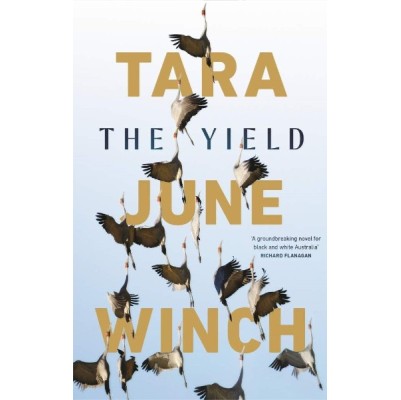When August Gondiwindi returns home from London to Massacre Plains for her grandfather Albert's funeral, it is to be faced with even more trauma: the family is about to be evicted from their ancestral land by a mining corporation. Although it will be up to August to prove their title to the land, Albert's legacy - a written record of the history and language of the Wiradjuri people - will be crucial to their fight.
Narrated by three different voices - August, Albert and the Reverend Greenleaf, a nineteenth century Lutheran missionary - this is the story of a land and its people, of a culture dispossessed.
Bearing witness to both intergenerational trauma and hope, this is a powerful and thought-provoking story written by an indigenous Australian author.
DUNED 029
25-06-2024
A demanding read told by three separate narrators. The final paragraph on the back of the cover sums it up very well.
AUCK 265
15-01-2024
We all agreed that the book was hard to begin with, but found it thought-provoking, topical, and well worth reading. This led to an interesting discussion.
OHOPE 010
22-11-2023
One of our group claimed it was "the best book I've ever read". We all enjoyed it and thought it a very worthwhile read - an amazing author.
GISB 012
02-10-2023
Everyone loved this book, which prompted much discussion about colonisation, religion, the retention of language and culture. One member loved it so much that she will buy a copy. And we are keen to read more of Tara June Winch.
WAIUK 001
27-09-2023
This split the group. Those that read it really enjoyed the story and will be searching for the author's other books. Other members found it difficult to settle into the book, told by three different people and generations.
MOTUE 008
13-07-2023
A difficult book to get into, but once mastered it was great.
HAMIL 007
08-06-2023
Members appreciated many things about this book, notably the picture it drew of the Gondiwindi people, their language and culture, the issues they had faced and continued to face in land loss and the loss of their home place. The writing is frequently lyrical and poetic despite the frequent harshness of what is being described. On the other hand, many found the structure disjointed as the narrative shifts among three distinct voices...The book's message is extremely important and despite many differences, finds an echo in Aotearoa/ New Zealand.
WHITBY 002
05-05-2023
We all liked this book, once we got used to the structure, and learned a lot from the three different "voices". It led to some interesting discussions on colonisation and the treatment of Maori, and their situation today.
WHANGA 002
26-04-2023
'The Yield' provided great discussion. Most found that the structure initially was a disadvantage and a little confusing with different voices speaking in different chapters. However all agreed that it was well worth reading. It was educational, and the Group all felt that they knew more about Aboriginal culture, having read 'The Yield'. There were interesting comparisons with New Zealand.
ONAWE 001
13-04-2023
Well liked by all the group, although generally agreed, not an 'easy' read. Good discussion around treatment of indigenous peoples and intergenerational issues, still resonating today. The construction ( with 3 narrators) was well received.
NELS 002
17-11-2022
Some members found it hard going but it generated lots of discussion.
UPMO 002
05-10-2022
An important book contributing to our understanding of the treatment of the indigenous population of Australia by racist white settlers. Part novel, part factual. Needed some perseverance in the first half to read.
COOKS 001
23-08-2022
A well-written, thought provoking account of colonial brutality and unfairness towards Aboriginal people that still exists today. The idea of the '3 voices' gives a clever account of the stages of history Winch has written about. The book is thought provoking, enjoyable and optomistic. Our discussion, as always, centred on the brutality of our colonial past and the time taken to 'rectify' these wrongs.
THAM 002
15-08-2022
Inspirational reading - a sensitive viewpoint of the effects of colonisation on the Australian aborigines.
RICH 010
03-08-2022
I think we were all very moved by the content of the story, but we also enjoyed the way in which it was written - invoking the language as a vehicle for the loss of culture, communication and ultimately the whole race. We are intending to follow up on the topic.
AUCK 440
29-04-2022
We enjoyed this book and agree with some of the reviews that it's important. Some of us only knew a snippet of Australian racial history so this was quite an eyeopener, quite shocking and sad. But there was still hope and in the end triumph in the story too - all was not lost. We enjoyed all the different voices telling the story - each bringing a different and important perspective.
ASHB 004
27-04-2022
This was a challenging read in terms of content, but an important one - the colonial treatment of indigenous races appalling, but somehow the treatment of Aboriginals (as revealed in this book) especially so. Some of us found it hard to get into, but it became more gripping as we got further in. We thought Tara Winch was very clever weaving the three narratives into a satisfying whole, that revealed the historical scars and their effect on the present. Beautiful writing...
MARTIN 005
14-10-2021
Only half of our group managed to finish. Didn't love the way it was written; interesting story but hard to get through.
NELS 062
06-08-2021
Four of our group of nine thought this a moving and beautifully written book. Others struggled with the format of 3 ongoing strands to the story. A complex book but led to a great discussion on colonisation, loss and returning.








